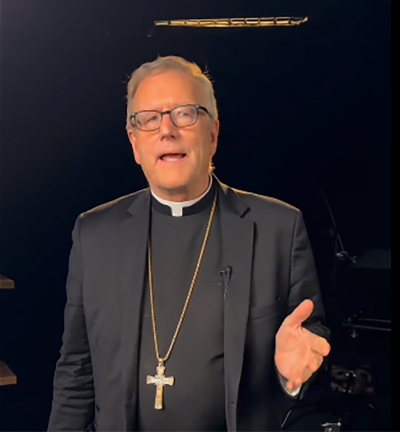Bishop Robert Barron clarifies Catholic teaching amid 'kerfuffle' over papal interview

In a lengthy thread posted to X on Wednesday, Bishop Robert Barron weighed in on the recent controversy that erupted after Pope Francis appeared to suggest mankind is "fundamentally good," which prompted accusations of heresy against the pontiff.
During his recent "60 Minutes" interview that aired Sunday, the pope told Norah O'Donnell that "everything" gives him hope when he looks at the world, and went on to suggest that the human heart is "good" because people do good things.
"You see tragedies, but you also see so many beautiful things," Francis said. "You see heroic mothers, heroic men, men who have hopes and dreams, women who look to the future. That gives me a lot of hope. People want to live. People forge ahead. And people are fundamentally good. We are all fundamentally good. Yes, there are some rogues and sinners, but the heart itself is good."
Many commenters on X criticized Francis for his remarks, with some accusing him of failing to grasp the Gospel, while others quoted portions of Scripture that teach God alone is good and that mankind has an intrinsically sinful nature. Somenoted that Francis' comments appeared to be an example of Pelagianism, a fifth century heresy that denied original sin.
"We are all fundamentally good. Yes, there are some rogues and sinners, but the heart itself is good," says Pope Francis. https://t.co/MmLPBhWVU2pic.twitter.com/7Be2GrKrdB
— 60 Minutes (@60Minutes) May 19, 2024
Barron, who serves as bishop of the Diocese of Winona-Rochester in Minnesota, attempted to clarify the pope's message by appealing to theological debates over the will that have been raging since the Protestant Reformation and even before.
I have been following with some interest the kerfuffle that followed Pope Francis’s declaration during a recent interview that we human beings are “basically good.” 1/8
— Bishop Robert Barron (@BishopBarron) May 22, 2024
"I have been following with some interest the kerfuffle that followed Pope Francis’s declaration during a recent interview that we human beings are 'basically good,'" Barron wrote. "The papal statement and ensuing controversy take us back to the 16th century and the great argument between Catholics and Protestants regarding theological anthropology."
Barron went on to explain that while reformers such as Martin Luther and John Calvin adhered to the doctrine of "total depravity" — which maintains that every human faculty has been corrupted by sin, including the will — Catholics take a less extreme view of human fallenness.
"To oversimplify, Protestants such as Martin Luther and John Calvin held to versions of a 'total depravity' anthropology, according to which human beings, in regard to salvation, are utterly hopeless, completely in need of a Savior," Barron wrote.
"Luther goes so far as to speak of the 'bondage of the will,' rather than of the 'freedom of the will.' The virtue of this approach is that it clearly implies our need for a savior and holds off all forms of Pelagianism," Barron continued.
While noting that the Council of Trent, which convened in response to the Reformation, agreed with many elements of the reformers' view of sin, Barron explained the view that grace builds upon "spiritual faculties" that remain intact despite the Fall.
"The Catholic Church responded officially to this challenge at the Council of Trent. And I bet many Catholics, reading the conciliar statements, would be surprised at how vigorously they nod toward the reformers," he said. "Trent does indeed teach that, due to the influence of both original and actual sin, we human beings are incapable of saving ourselves. We have lost the holiness and justice which should be ours."
"Our minds, will, [and] freedom have been so compromised that we absolutely need a Savior. The difference is that Trent does not hold to a total depravity anthropology, but rather teaches that our basic spiritual faculties remain intact, giving grace, in fact, something to build on," he added.
"When the Pope says that we are all 'basically good,' he means precisely this, it seems to me," Barron added. "He by no means is implying thereby that we don’t need a Savior."
Many users replied agreeably to the nuance of Barron's comments, though some also expressed a desire that Francis would be more precise in his rhetoric.
Jon Brown is a reporter for The Christian Post. Send news tips to jon.brown@christianpost.com





















